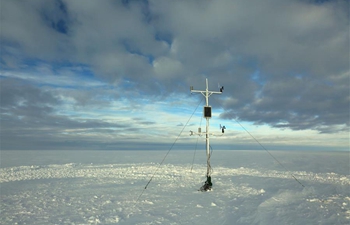ATHENS, Feb. 9 (Xinhua) -- A new Hellas Sat satellite was successfully launched this week strengthening Greece's presence in space, as the country is exploring economic benefits in all sectors, after experiencing an acute debt crisis.
"Hellas Sat 4 satellite is the largest satellite for commercial use Lockheed Martin has constructed so far. It has a capability of 20 KW and weighs about 6.5 tons. It uses very innovative systems," Thomas Kalamaris, Technical Director of satellite operator Hellas Sat, told Xinhua on Friday.
During a tour at the company's ground facilities in a suburb of Athens, he explained the significance of the project for Greece.
Hellas Sat is a satellite communications solutions provider founded in 2001 when Hellas Sat 2 was launched into space. The company was acquired in 2013 during the crisis by Saudi Arabia's Arabsat, the 6th largest satellite operator in the world.
On Feb. 5 this year Hellas Sat 4 satellite was launched from the Guiana Space Center in Kourou, French Guiana, to be positioned at 39 degrees East providing coverage over Europe, the Middle East and the Southern Africa. The satellite is expected to commence service in the third quarter of 2019, according to a company press statement.
Hellas Sat 4 will serve as a back-up to Hellas Sat 3 satellite which is located at the same orbital slot and was launched in 2017, extending the company's capacity.
"I have to pay our tribute to the engineering team who worked together for four years for this very special project ... We will be in touch for the next 23 years," Christodoulos Protopapas, CEO of Hellas Sat, said shortly before the launch.
Hellas Sat 4 has a design life of 23 years and its launch was a key part of Hellas Sat's plan to offer more and better services to its clients, Kalamaris told Xinhua, underlining the important economic benefit for Greece.
"The Greek state and Hellenic Space Organization can receive services, they are already getting services, from Hellas Sat's satellites in the context of compensating benefits for the use of the 39°East orbital slot by the company," he said.
State entities do no longer have to pay for satellite communications solutions other providers, but get access to Hellas Sat's services free of charge.
As part of efforts to rebuild the ailing Greek economy, the Greek state launched last year also the country's first space agency, the Hellenic Space Organization.
The goal is to try to make the most in following years of Greece's participation in the European Space Agency (ESA).
Greece is a member of ESA since 2005 and has invested millions of euros in ESA's research programs, but was one of the few member states lacking a national institution which could exploit to the full the results,
Minister of Digital Policy, Telecommunications and Media Nikos Pappas has explained.
Given that the space sector generates a sevenfold return on investment worldwide in recent years, as the Greek official has stressed, Greece is making steps also in this field.













